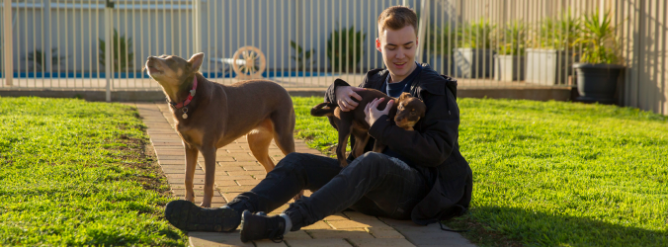Resources and links
There are many resources available that can help you to manage your conditions. See below for some ideas.

There are many resources available that can help you to manage your conditions. See below for some ideas.

15 SEC READ

The voices of lived experience
For many people, being diagnosed with IBD is a shock to the system and you may feel like life will never be the same again. Whilst it’s common to feel overwhelmed, it’s important to remember that you’re not alone. In the following videos, you can watch real people talk about their IBD journey and share what they learned along the way.
Messages to my Former Self
FLIC’S STORY: LIVING WELL WITH CROHN’S DISEASE
DANNY’S STORY: LIVING WELL WITH CROHN’S DISEASE
DEZ’S STORY: LIVING WELL WITH CROHN’S DISEASE
MARY’S STORY: LIVING WELL WITH CROHN’S DISEASE
Stephanie’s story: Living well with Ulcerative Colitis
Justan’s story: Living well with Crohn’s disease
Amy’s story: Living well with Crohn’s disease
Sarah & Elliot's Story: Living well with Crohn’s disease
MAREK’S STORY:
MAREK SHARES HIS EXPERIENCE WITH ULCERATIVE COLITIS
Brian's Story:
Brian shares his experiences with Crohn's Disease


15 MIN READ
Helpful links

The following list of resources and website links may provide further helpful information (these site links were live as at June 2023).
Crohn's & Colitis Australia (CCA) is the peak national body representing more than 85,000 Australians living with Crohn's disease or ulcerative colitis, collectively known as inflammatory bowel disease (IBD). For over 30 years CCA has been helping make life more liveable for Australians living with IBD by driving quality of care for our community by educating, supporting, increasing awareness, advocating and research. CCA's programs and services include information forums, support groups, online and telephone helpline, research programs, youth camps, 'Can't Wait Card' and Crohn's & Colitis Hub.
Crohn's and Colitis New Zealand is a charitable trust which aims to provide support, advice, resources and information about Crohn's disease and Ulcerative Colitis. The organisation was established by individuals affected by Crohn’s and Colitis, and medical specialists active in the treatment of these chronic diseases.
The IBD Helpline is a free national telephone service offered by Crohn’s and Colitis Australia that provides support, information, counselling and referrals for people living with inflammatory bowel disease (IBD). The helpline provides access to an experienced volunteer counsellor between 9am and 5pm (EST), Monday to Friday for emotional support and coping strategies. Please note that the IBD Helpline is not a 24/7 Crisis Line. If there is an emergency, please contact the nearest hospital or local GP.
When you have IBD, you may sometimes experience an urgent need to use the toilet. The Can’t Wait card is issued to members of Crohn’s and Colitis Australia who have been diagnosed with IBD. The card gives the bearer priority access to a toilet, which can be of great help in those urgent moments.
Many people with Crohn’s disease or ulcerative colitis stay at home during a disease flare up, due to the fear of not being able to access a public toilet. The National Public Toilet Map website allows visitors to browse for or search for public toilets across Australia. The ‘Trip Planner’ function allows visitors to identify toilet stops for a long car journey (for example, between Sydney and Melbourne). A National Public Toilet Map app is available for the iPhone.
Continence helpline 1800 33 00 66.
MindOverGut provides information and free online evidence-based psychological programs developed by Australian Psychogasteronology expert Dr Simon Knowles. This site also contains a list of other psychology-orientated clinicians with an interest in IBD.
Tame your Gut is a 10-week program of cognitive behavioural therapy (CBT) specially developed for people living with IBD by Australian researchers and clinicians.
The Dieticians Association of Australia website provides a listing of accredited practising dieticians, who have the qualifications and skills to assist people to manage a range of health conditions including inflammatory bowel disease. These dieticians can assess an individual’s nutritional needs and develop a personalised eating plan. You can search for a dietician by geographical location and by language.
Dietitians NZ is New Zealand’s professional association for registered dietitians. It exists to build a strong and sustainable profession that empowers New Zealanders about food and nutrition: and inspire change to enhance the health and wellbeing of Aotearoa New Zealand. The majority of members are registered dietitians, associate members who are either scientists with nutrition qualifications or dietitians who are not currently practicing. Dietitians NZ have a National Office in Wellington, seven branches and 16 Special Interest Groups [SIGs].
The Monash University Low FODMAP diet helps manage symptoms of IBS by providing information on too to eat and those to avoid restricting foods that are high in certain short-chain-carbohydrates (sugars) called FODMAPs (fermentable oligosaccharides, disaccharides, monosaccharides and polyols), which are poorly absorbed by the gastrointestinal tract. Information about the app is available from the website.
The Gastroenterological Society of Australia (GESA) is the chief advocacy group for healthcare professionals and scientists working in the fields of gastroenterology and hepatology. It provides both professional and consumer information and offers a ‘Find a Gastroenterologist’ service for GPs, as well as the general public. The ‘Members Area’ for healthcare professionals provides access to the Journal of Gastroenterology & Hepatology and Alimentary Pharmacology & Therapeutics.
The Australian Council of Stoma Associations (ACSA) website provides links to information for people planning to undergo ‘ostomy’ surgery (e.g. colostomy, ileostomy etc.) and those who have undergone ‘ostomy’ surgery. This website also provides useful information on travelling overseas following ‘ostomy’ surgery.
A not-for-profit organisation dedicated to raising funds for research into IBD.
visit website or call 13 78 48
Quitline is a telephone support and coaching service that can increase a person’s chances of quitting smoking. Callers can request a ‘Quit Pack’ to be sent to them free-of-charge. Quitline’s advisors can also offer advice on the range of quitting products available, how effective each product is, and practical advice on how to use these products.
visit website or call 0800 778 778
Quitline New Zealand helps people beat smoke addiction. The organisation provided free services and resources, available to all New Zealanders. An advisor is available to help callers talk through the three parts of smoking addition. Through Quitline, callers can receive a Quit Pack full of resources, as well as order products to help them quit smoking.
Job Access Advisors provides workplace adjustments and solutions for those with IBD. It also gives information regarding an employment assistance fund, which can provide financial assistance for work-related modifications.
Centrelink is a program in the Department of Human Services that delivers a range of payments and services for a wide range of people e.g. unemployed, families and people with disabilities. It also provides services in times of major change. At present, there are three types of payments available for people with a medical condition who are looking for work – the Newstart Allowance, Disability Support Pension and Sickness Allowance. Please note that Centrelink requires documented evidence for all medical conditions.